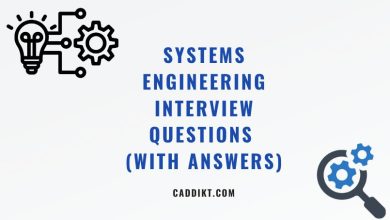Welcome to our comprehensive article on computer engineering interview questions and answers. If you’re preparing for a computer engineering job interview or seeking to expand your knowledge in the field, you’ve come to the right place. In this article, we have compiled a carefully curated list of 50 commonly asked interview questions in computer engineering along with detailed answers.
Computer engineering interviews can cover a wide range of topics, including software development, hardware design, algorithms, data structures, networking, and more. Our goal is to equip you with the knowledge and insights necessary to confidently tackle these questions during your interview. Whether you are a recent graduate or an experienced professional, this resource will help you refresh your understanding and prepare effectively.
Each question in this article is followed by a concise and human-readable answer that avoids technical jargon and explains the concepts in a clear and understandable manner. We encourage you to study and familiarize yourself with these questions and answers, as they will not only enhance your technical knowledge but also improve your confidence and performance during the interview process.
Master Your Computer Engineering Interview with These 50 Essential Questions and Answers
1. What is computer engineering?
Computer engineering is a field that combines elements of electrical engineering and computer science to design, develop, and analyze computer systems and their components.
2. What are the primary components of a computer system?
The primary components of a computer system include the central processing unit (CPU), memory, input devices, output devices, and storage devices.
3. What is the difference between computer engineering and computer science?
Computer engineering focuses on the design and development of computer hardware and software systems, while computer science primarily deals with the theoretical and practical aspects of computing.
4. What are the key skills required to become a computer engineer?
Key skills required to become a computer engineer include proficiency in programming languages, understanding of computer hardware and software, problem-solving abilities, and strong analytical and critical thinking skills.
5. What is the role of a computer engineer in software development?
A computer engineer in software development is involved in designing, coding, testing, and maintaining software systems. They ensure the efficient utilization of hardware resources and optimize software performance.
6. What is the difference between hardware and software engineering?
Hardware engineering focuses on the design and development of computer hardware components, while software engineering involves the design and development of software systems and applications.
7. How does a computer processor work?
A computer processor executes instructions and performs calculations by fetching instructions from memory, decoding them, executing the necessary operations, and storing the results.
8. What is binary code, and why is it important in computer engineering?
Binary code is a system of representing data and instructions using zeros and ones. It is important in computer engineering because digital systems use binary code to process and store information.
9. What is the purpose of an operating system?
An operating system manages computer hardware and software resources, provides services to applications, and acts as an intermediary between the user and the computer system.
10. What is the difference between analog and digital signals?
Analog signals are continuous, representing data as a continuous waveform, while digital signals are discrete, representing data as a sequence of discrete values (usually binary).
11. How do computer engineers contribute to the development of artificial intelligence?
Computer engineers contribute to the development of artificial intelligence by designing and implementing algorithms, developing hardware architectures optimized for AI tasks, and creating software systems for AI applications.
12. What is the role of computer engineers in cybersecurity?
Computer engineers play a crucial role in cybersecurity by developing secure systems, designing encryption algorithms, implementing security protocols, and analyzing and mitigating vulnerabilities.
13. How does computer memory work?
Computer memory stores data and instructions for immediate access by the processor. It consists of different types of memory, such as RAM and cache, which provide fast and temporary storage, and secondary storage devices like hard drives, which offer long-term storage.
14. What are the different programming languages used in computer engineering?
There are various programming languages used in computer engineering, including C, C++, Java, Python, JavaScript, and many others. Each language has its strengths and weaknesses, and their usage depends on the specific requirements of the project or application.
15. What is the difference between RAM and ROM?
RAM (Random Access Memory) is a type of computer memory that is volatile, meaning its contents are lost when the power is turned off. It is used for temporary storage of data and program instructions during execution. On the other hand, ROM (Read-Only Memory) is non-volatile memory that contains permanent instructions or data that cannot be modified or erased by normal computer operations.
16. What is the concept of pipelining in computer architecture?
Pipelining is a technique used in computer architecture to improve the performance of processors. It involves breaking down instructions into smaller stages and executing them concurrently in a pipeline fashion, allowing multiple instructions to be processed simultaneously.
17. What is the role of computer engineers in designing computer networks?
Computer engineers play a vital role in designing computer networks by selecting and configuring network hardware and software components, designing network topologies, ensuring efficient data transmission, and addressing network security concerns.
18. What are the different types of computer storage devices?
There are various types of computer storage devices, including hard disk drives (HDDs), solid-state drives (SSDs), optical drives (CD/DVD), USB flash drives, and memory cards. Each type has its own characteristics in terms of capacity, speed, and portability.
19. How does a computer engineer design a computer graphics system?
A computer engineer designs a computer graphics system by developing algorithms for rendering and manipulating graphics, designing specialized hardware (e.g., graphics cards), optimizing graphics performance, and integrating graphics capabilities into software applications.
20. What is the role of computer engineers in embedded systems design?
Computer engineers play a crucial role in embedded systems design by developing hardware and software systems for specific applications, integrating components into a cohesive system, optimizing performance and power efficiency, and ensuring reliability and safety in embedded systems.
21. What is the difference between a microprocessor and a microcontroller?
A microprocessor is a central processing unit (CPU) that performs general-purpose computations and requires external components (e.g., memory, input/output devices) for a complete system. In contrast, a microcontroller combines a microprocessor, memory, and input/output peripherals into a single integrated circuit, making it suitable for embedded systems and specialized applications.
22. How do computer engineers ensure the reliability of computer systems?
Computer engineers ensure the reliability of computer systems through various techniques such as redundancy, error-checking mechanisms, fault-tolerant design, thorough testing and verification, and implementing error recovery strategies.
23. What is the significance of Moore’s Law in computer engineering?
Moore’s Law, named after Gordon Moore, states that the number of transistors on a microchip doubles approximately every two years, leading to a rapid advancement in computing power and miniaturization of electronic devices. It has been a guiding principle in computer engineering, driving innovation and technological progress.
24. What are the challenges faced by computer engineers in designing high-performance computing systems?
Designing high-performance computing systems poses challenges such as managing heat dissipation, minimizing power consumption, optimizing memory bandwidth, ensuring scalability, dealing with parallel processing and synchronization, and balancing the trade-offs between performance, cost, and energy efficiency.
25. How do computer engineers optimize computer algorithms
Computer engineers optimize computer algorithms through a combination of techniques such as algorithmic analysis, data structure optimization, parallel processing, algorithmic complexity analysis, hardware-specific optimization, software optimization, and experimental analysis. They analyze the algorithm’s time and space complexity, choose appropriate data structures, leverage parallel processing capabilities, consider hardware architectures, optimize software implementations, and conduct experiments to fine-tune and validate the algorithm’s performance. These approaches enable computer engineers to improve algorithm efficiency, reduce execution time, and enhance overall system performance.
26. What is the role of computer engineers in data analysis and data mining?
Computer engineers play a crucial role in data analysis and data mining by developing algorithms and software tools to extract meaningful insights from large datasets, designing efficient data storage and retrieval systems, and implementing data analysis techniques to support decision-making processes.
27. What is the concept of parallel processing in computer engineering?
Parallel processing is the simultaneous execution of multiple tasks or instructions by dividing them into smaller subtasks that can be processed independently. Computer engineers leverage parallel processing to improve computational speed and efficiency, especially in tasks that can be parallelized, such as simulations, image processing, and large-scale data analysis.
28. What is the role of computer engineers in developing mobile applications?
Computer engineers contribute to the development of mobile applications by designing and developing the underlying software architecture, creating efficient algorithms for mobile platforms, optimizing performance and power consumption, and ensuring compatibility across different devices and operating systems.
29. How does a computer engineer design a computer motherboard?
A computer engineer designs a computer motherboard by considering factors such as the processor and chipset compatibility, determining the layout and interconnections of various components (e.g., CPU, memory slots, expansion slots), ensuring proper power delivery and signal integrity, and complying with industry standards and specifications.
30. What is the role of computer engineers in developing virtual reality systems?
Computer engineers contribute to the development of virtual reality systems by designing specialized hardware components (e.g., graphics cards, sensors) optimized for virtual reality, developing software algorithms for real-time rendering and immersive experiences, and integrating hardware and software components to create seamless virtual reality environments.
31. What is the impact of quantum computing on computer engineering?
Quantum computing has the potential to revolutionize computer engineering by enabling faster and more efficient computations for certain types of problems. Computer engineers are exploring the design and development of quantum computers, quantum algorithms, and quantum-resistant cryptography to harness the power of quantum computing and address new computational challenges.
32. What are the different types of computer architecture?
There are different types of computer architecture, including von Neumann architecture, Harvard architecture, SIMD (Single Instruction, Multiple Data), MIMD (Multiple Instruction, Multiple Data), and RISC (Reduced Instruction Set Computing) architecture. Each architecture has its own characteristics in terms of instruction execution, memory organization, and data processing.
33. How do computer engineers design power-efficient computer systems?
Computer engineers design power-efficient computer systems by optimizing hardware components for low power consumption, employing power management techniques such as dynamic voltage scaling and clock gating, implementing efficient algorithms and software optimizations, and adopting energy-efficient design principles.
34. What is the role of computer engineers in designing computer peripherals?
Computer engineers play a role in designing computer peripherals by developing the hardware and software interfaces required for communication between the computer system and peripheral devices, ensuring compatibility and interoperability, and optimizing performance and user experience.
35. How does a computer engineer contribute to the field of robotics?
A computer engineer contributes to the field of robotics by developing the software systems that control robotic devices, designing algorithms for perception, motion planning and control, integrating sensors and actuators into robotic systems, and optimizing the performance and efficiency of robotic algorithms and systems.
36. What is the concept of fault-tolerant computing in computer engineering?
Fault-tolerant computing is the design and implementation of computer systems that can continue operating even in the presence of hardware or software faults or failures. Computer engineers employ techniques such as redundancy, error detection and correction, and fault recovery mechanisms to ensure the reliability and availability of critical systems.
37. What are the ethical considerations in computer engineering?
Ethical considerations in computer engineering include issues such as privacy, security, intellectual property rights, accessibility, social impact, and responsible use of technology. Computer engineers need to be aware of these considerations and make ethical decisions in the design, development, and use of computer systems.
38. What is the role of computer engineers in developing internet of things (IoT) systems?
Computer engineers play a crucial role in developing IoT systems by designing and implementing the hardware and software components required for IoT connectivity, developing communication protocols, ensuring data security and privacy, and enabling the integration of IoT devices into larger systems and networks.
39. How does a computer engineer design a computer user interface?
A computer engineer designs a computer user interface by considering factors such as user requirements, usability principles, visual design, and interaction design. They develop software interfaces, design graphical elements, implement user interaction features, and conduct usability testing to create intuitive and user-friendly interfaces.
40. What is the role of computer engineers in the development of autonomous vehicles?
Computer engineers play a significant role in the development of autonomous vehicles by designing the software and hardware systems that enable autonomous navigation, perception of the environment, decision-making, and control. They work on sensor integration, machine learning algorithms, real-time processing, and safety-critical systems for autonomous driving.
41. What is the concept of cloud computing in computer engineering?
Cloud computing is the delivery of computing resources, such as storage, processing power, and software applications, over the internet on a pay-as-you-go basis. Computer engineers are involved in designing and implementing the infrastructure, developing cloud-based software platforms, ensuring scalability and security, and optimizing resource allocation and management in cloud computing systems.
42. What are the different types of computer networks?
There are different types of computer networks, including local area networks (LANs), wide area networks (WANs), metropolitan area networks (MANs), and wireless networks (Wi-Fi, cellular networks). Each type has its own characteristics in terms of coverage, speed, and connectivity options.
43. How do computer engineers ensure the security of computer systems?
Computer engineers ensure the security of computer systems by implementing security measures such as encryption, access control mechanisms, intrusion detection systems, firewalls, and secure coding practices. They also stay updated with emerging threats, perform vulnerability assessments, and apply patches and updates to protect against potential security breaches.
44. What is the role of computer engineers in the field of bioinformatics?
Computer engineers contribute to the field of bioinformatics by developing computational tools, algorithms, and databases for analyzing biological data, such as DNA sequences, protein structures, and gene expression data. They facilitate data storage, retrieval, analysis, and visualization to support biological research and discoveries.
45. How does a computer engineer contribute to the development of natural language processing systems?
A computer engineer contributes to the development of natural language processing (NLP) systems by designing algorithms and models for language understanding, speech recognition, text analysis, and machine translation. They work on developing linguistic resources, building NLP libraries and frameworks, improving language models, and optimizing the performance and accuracy of NLP applications.
46. What is the concept of real-time computing in computer engineering?
Real-time computing refers to the design and implementation of computer systems that can guarantee timely response to events and tasks with strict timing constraints. Computer engineers develop real-time operating systems, design algorithms for real-time data processing, and create systems that can meet stringent deadlines and provide predictable performance in time-critical applications.
47. What are the different types of computer programming paradigms?
There are various types of computer programming paradigms, including procedural programming, object-oriented programming, functional programming, logical programming, and declarative programming. Each paradigm provides a different approach to structuring and organizing code to solve problems effectively.
48. How do computer engineers design fault-tolerant computer networks?
Computer engineers design fault-tolerant computer networks by implementing redundancy mechanisms such as backup links, alternate routing paths, and network load balancing. They develop fault detection and recovery mechanisms, use error-correcting codes, and ensure high availability and reliability in network infrastructure to minimize downtime and data loss.
49. What is the role of computer engineers in the field of image processing?
Computer engineers play a significant role in the field of image processing by developing algorithms and techniques for image acquisition, enhancement, compression, recognition, and analysis. They design image processing systems, optimize performance for real-time processing, and apply computer vision techniques to extract meaningful information from images for various applications.
50. What is the future scope of computer engineering?
The future scope of computer engineering is vast and promising. With advancements in technologies such as artificial intelligence, machine learning, quantum computing, and IoT, computer engineers will continue to be at the forefront of innovation. The scope includes developing more efficient and powerful computing systems, improving cybersecurity measures, advancing robotics and automation, exploring new frontiers in data science and analytics, and contributing to emerging fields such as bioinformatics, virtual reality, and sustainable computing.
Conclusion
ddd









